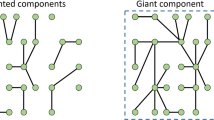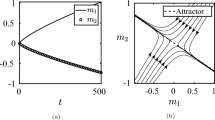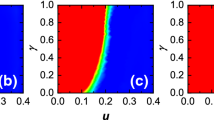Abstract.
We study effects of average degree on cooperation in the networked prisoner's dilemma game. Typical structures are considered, including random networks, small-world networks and scale-free networks. Simulation results show that the average degree plays a universal role in cooperation occurring on all these networks, that is the density of cooperators peaks at some specific values of the average degree. Moreover, we investigated the average payoff of players through numerical simulations together with theoretical predictions and found that simulation results agree with the predictions. Our work may be helpful in understanding network effects on the evolutionary games.
Similar content being viewed by others
References
R. Sugden, The Economics of Rights, Co-operation and Welfare (Blackwell, Oxford, UK, 1986)
Genetic and Cultural Evolution of Cooperation, edited by P. Hammerstein (MIT, Cambridge, MA, 2003)
K. Sigmund, Games of Life (Oxford University Press, Oxford, 1993)
R. Axelrod, The Evolution of Cooperation (Basic books, New York, 1984)
J. von Neumann, O. Morgenstern, Theory of Games and Economic Behaviour (Princeton University Press, Princeton, 1944)
A.M. Colman, Game Theory and its Applications in the Social and Biological Sciences (Butterworth-Heinemann, Oxford, 1995)
J. Maynard Smith, Evolution and the Theory of Games (Cambridge University Press, Cambridge, England, 1982)
J. Hofbauer, K. Sigmund, Evolutionary Games and Population Dynamics (Cambridge University Press, Cambridge, UK, 1998)
D.J. Watts, Small Worlds: The Dynamics of Networks Between Order and Randomness (Princeton, New Jersey, 1999)
H. Gintis, Game Theory Evolving (Princeton University, Princeton, NJ, 2000)
M. Nowak, K. Sigmund, Nature (London) 355, 250 (1992)
M. Nowak, K. Sigmund, Nature (London) 364, 56 (1993)
M. Nowak, R.M. May, Nature (London) 359, 826 (1992); Int. J. Bifurcation Chaos Appl. Sci. Eng. 3, 35 (1993)
M. Doebeli, N. Knowlton, Proc. Natl. Acad. Sci. USA 95, 8676 (1998)
T. Killingback, M. Doebeli, N. Knowlton, Proc. R. Soc. Lond. B 266, 1723 (1999)
M. Sysi-Aho et al., Eur. Phys. J. B 44, 129 (2005)
M. Doebeli, N. Knowlton, Proc. Natl. Acad. Sci. USA 95, 8676 (1998)
G. Szabó, C. Töke, Phys. Rev. E 58, 69 (1998)
G. Szabó, C. Hauert, Phys. Rev. Lett. 89, 118101 (2002)
L.-X. Zhong, D.-F. Zheng, B. Zheng, P.M. Hui, arXiv:physics/0602039
W.-X. Wang, J. Ren, G. Chen, B.-H. Wang, arXiv:physics/0604103
G. Abramson, M. Kuperman, Phys. Rev. E 63, 030901(R) (2001)
B.J. Kim et al., Phys. Rev. E 66, 021907 (2002)
H. Ebel, S. Bornholdt, Phys. Rev. E 66, 056118 (2002)
Z.-X. Wu, X.-J. Xu, Y. Chen, Y.-H. Wang, Phys. Rev. E 71, 037103 (2005)
G. Szabó, C. Hauert, Phys. Rev. E 66, 062903 (2002)
G. Szabó, J. Vukov, Phys. Rev. E 69, 036107 (2004)
J. Vukov, G. Szabó, Phys. Rev. E 71, 036133 (2005)
C. Hauert, G. Szabó, Am. J. Phys. 73, 405 (2005)
J. Ren, W.-X. Wang, G. Yan, B.-H. Wang, arXiv:physics/0603007
C. Hauert, M. Doebeli, Nature 428, 643 (2004)
F.C. Santos, J.M. Pacheco, Phys. Rev. Lett. 95, 098104 (2005).
F.C. Santos, J.F. Rodrigues, J.M. Pacheco, Proc. Roy. Soc. Lond. B 273, 51 (2006)
A.-L. Barabási, R. Albert, Science 286, 509 (1999)
M.E.J. Newman, D.J. Watts, Phys. Rev. E 60, 7332 (1999)
D.J. Watts, S.H. Strogatz, Nature 393, 440 (1998)
P. Erdös, A. Rényi, Publ. Math. (Debrecen) 6, 290 (1959)
G. Szabó, J. Vukov, A. Szolnoki, Phys. Rev. E 72, 047107 (2005)
Author information
Authors and Affiliations
Corresponding author
Rights and permissions
About this article
Cite this article
Tang, CL., Wang, WX., Wu, X. et al. Effects of average degree on cooperation in networked evolutionary game. Eur. Phys. J. B 53, 411–415 (2006). https://doi.org/10.1140/epjb/e2006-00395-2
Received:
Published:
Issue Date:
DOI: https://doi.org/10.1140/epjb/e2006-00395-2




